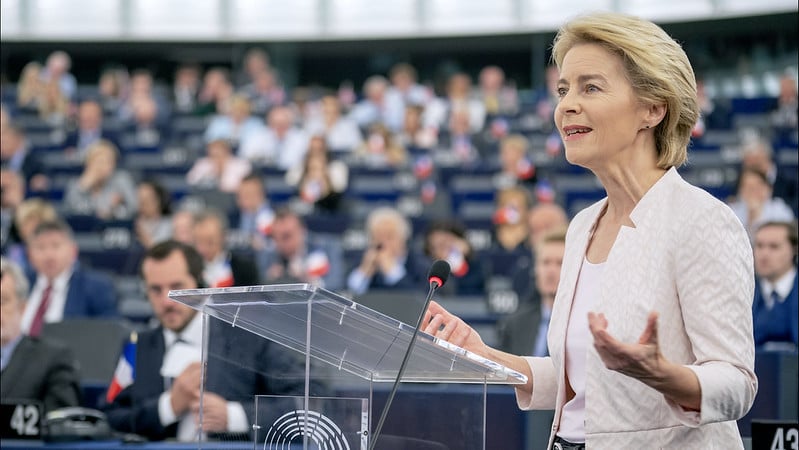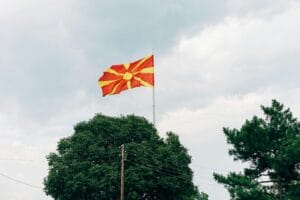Commission President Ursula von der Leyen adressing MEPs, 2019 (Flickr)
In the ninth edition of Berlin Process Summit, the EU presented a support package for the Western Balkans to help address the immediate consequences of the energy crisis resulting from the Russian invasion in Ukraine. This support from Brussels will ease some of the pressure in these countries. The summit also made clear, however, that the European future of the Western Balkans remains in limbo, with few concrete leads.
Brussels offers helping hand in spiraling energy crisis
With cold winters being no stranger to the Western Balkans, more and more countries struggled to supply themselves with energy. Particularly as many of the countries in this region were reliant on gas from Russia, a source that Europe advocated to limit in times of war. Therefore, it seems only logical that Brussels proposed a support package of 1 Billion Euro for the Western Balkans, as the region finds itself in a dilemma to navigate between providing households and preventing from going against Europe’s grain. The EU support package serves the purpose to prevent situations similar to what happened in Serbia, which recently signed a deal with Russian state-owned gas supplier Gazprom. In times of need and calls for help, the EU answered by reaching out. A move that can only be warmly welcomed.
EU accession remains a troublesome topic
That was not the only news from the Berlin Process Summit. The conference, it’s ninth edition already, platformed further discussion on the perspectives of EU accession for countries in the Western Balkans remained without a concise answer. During her statement at the summit, European Commission President Ursula von der Leyen said:
“Our aim is very clear: It is the aim to bring our Western Balkan partners as close as possible, as fast as possible. And here we have two tracks: One track of work is of course the accession process. There, we have made good progress. The Commission has put enlargement back on the table, from the very first day of my mandate. We have been securing agreement on a new enlargement methodology that opened up ways, not only to unblock decisions – that was very important – but it also brought back credibility to the whole process.”
The determination in Von der Leyen’s words, however, is not reflected in the EU’s actions. Of course, good steps have been taken towards European integration of the Western Balkans. Perhaps the most recent example is the recommendation of granting Bosnia the candidate status. This recommendation came with a roadmap, listing the key priorities towards eventual accession methodologically.
However, the question is mainly whether the EU’s idea of integration concurs with those held in the Western Balkans. The European Political Community (EPC) is such an example, a proposal by French President Emmanual Macron entailing the establishment of a European political space, beyond the European Union. According to the proposal, the EPC may constitute a (first) step towards EU membership. For countries in the Western Balkans who have long-standing applications under consideration, the EPC might feel more as second-hand membership rather than a “fast-track” to EU accession.
Future of the summit and regional perspectives
Despite the above criticism, the functional role of the Berlin Process Summit is undeniable. Especially in the area of economic integration, the ultimate goal of this summit, and strengthening the dialogue between the EU and the Western Balkans, the Berlin Process summit shows its value. In addition to the EU support package, a major investment plan was presented to strengthen the regional economy. Simultaneously, the conference offers a platform welcoming societal stabilisation in the region. On 3 November, leaders of Albania, Bosnia and Herzegovina, Kosovo, Montenegro, North Macedonia, and Serbia signed agreements which enable citizens of these countries to cross borders between them using only an identity card. They also agreed upon recognition of each other’s university qualifications and the professional qualifications of doctors, dentists, and architects.
Such positive developments offer hope in times of instability in the region and the long-running process of EU accession. It underlines the importance of facilitating this conference, which will take place in Albania in December. Nevertheless, there is much work for both the region and the EU to do to provide a path of prospects rather than a path of obstacles. Ultimately, von der Leyen’s description of bringing Western Balkan partners as close as possible is only possible in one way, which is being inducted into the EU.
At the very least, countries feel that after years of stagnation in the enlargement process, there is finally solidarity from the EU towards its non-members. A resumption was initiated after the war in Ukraine, as the fear of tensions in the Western Balkans might be prone to Russian interference and escalation. Efforts are now being made on both sides to move closer to eventual accession. PM Rama of Albania, for instance, indicated that the countries in the region finally no longer feel alone. It shows that despite the dialogue not always running smoothly, there are opportunities to bring Europe closer together.
Author: Mathieu Neelen
Sources: TheConversation, DGAP, Euractiv, EuropeanCommission1, EuropeanCommission2,
Photo: Flickr



